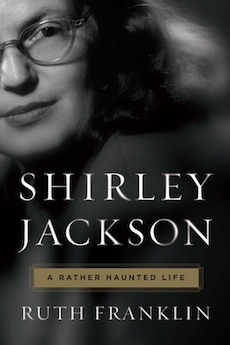Winner of the 2017 Christian Gauss Award
By Lewis Fried
Now that so many of Shirley Jackson’s works are accessible, Ruth Franklin’s timely biography offers us a welcome comprehension of her life and fiction. Franklin provides the reader with a context as well as a concept; she not only places her subject within the generation of women addressed by Betty Friedan’s The Feminine Mystique (1963) but also analyzes Jackson’s fiction within the development of the gothic sensibility, particularly an American gothic temper. As the subtitle of Franklin’s biography indicates, Jackson was, indeed, haunted—haunted so much so that we can suggest that her fiction was apotropaic, something of an amulet countering what shadowed her life. On all counts, Franklin’s book succeeds.
Although it is usually futile to question the specific origin of an individual talent, it is enormously helpful to see how a writer responded to, and claimed, a subject—in other words, how a writer impressed her signature upon the substance of her work. In this regard, Franklin’s work is luminous as well as lucid. She offers us a gifted author who was devoted to, and claimed by, literature. Nevertheless, the callousness, especially of her mother, and the serial adulteries of her husband, the eminent literary critic Stanley Edgar Hyman, blocked her need to be loved and valued. What Jackson did achieve in the face of such neglect was the development of a “counternarrative,” and here it is important to quote Franklin: Jackson’s “body of work constitutes nothing less than the secret history of American women of her era.” Her stories reveal “the unhappiness and instability beneath the housewife’s sleek veneer of competence.”
Although Jackson’s fiction is notable for its effect and narrative rhythm, her work is often marked by a rough-grained anxiety and a resigned bitterness. As a result, she had a divided reputation: as a writer of “domestic” comedy, with her humorous accounts of raising her children, and as an author probing the fears of chaos, social and supernatural, lapping around normal lives. Did her household comedy militate against her rendition of the insults and blackness suffusing American culture? What can we make of the charm of “domestic” narratives even when they infiltrate her ominous works? Or do the two modes complement each other so profoundly that we accept that the ordinary is often the appropriate context for terror. After all, “The Lottery” deals with a sacrificial ritual (whose origins have been forgotten) of stoning a person to death, in this case, a housewife. It opens almost artlessly, striking the bell of popular romance with the motifs of an inviting, timeless pastoral, but also with the specificity of the here and now: “The morning of June 27th was clear and sunny with the fresh warmth of a full-summer day…” Of course, Jackson is setting us up.
Jackson’s interest in the supernatural and the demonic flourished well in a realistic setting. Her ability to blend the natural with the supernatural, Franklin argues, served as an alchemy for her imagination confronting the ordinary. “But on some level,” Franklin urges, “writing was a form of witchcraft to Jackson—a way to transform everyday life into something rich and strange, something more than what it appeared to be.”
Her growing acclaim as a writer was offset by anxieties and depressions that were insuperable, accompanied by panic attacks, delusions, and psychiatric drug dependency finally making her into something of a recluse. This situation was the end of an increasingly unbalanced life, most notably beginning with her college years, and Hyman’s courtship of her, when they were students at Syracuse. (Upon reading a piece by her, he decided that she was the woman he would marry.) Jackson’s anger at his infidelities made its way into her writing. For example, her “Hangsaman…on one level” Franklin observes, is “unmistakably a document of Jackson’s rage at her husband.” Read alongside explorations of myth and ritual, such as Jane Harrison’s Themis (1912), Arnold Van Gennep’s discussion of rites of passage, and Joseph Campbell’s claim that a “monomyth” underlay every myth (works that Stanley Edgar Hyman saw as the foundation in the study of ritual and myth), many of Jackson’s fictions connect an education to the education binding an individual to the fables of a universal culture. In Jackson’s case, she was certainly transfigured from a naïf but had no release from her psychological suffering.
Franklin’s compelling interpretation of Jackson’s art and life is an example of how so many dimensions (now often fractionated in much criticism), such as gender, class, desire, and the uniqueness of an imagination not only compose the self but also how they militate against a self. Jackson’s life had no happy ending; her writing, nevertheless, challenges the complacency of believing if endings, happy or not, are possible at all.
Lewis Fried (ΦBK, Queen’s College, CUNY, 1964) is Professor of English Emeritus at Kent State University and a resident member of the Nu of Ohio Chapter of Phi Beta Kappa.




